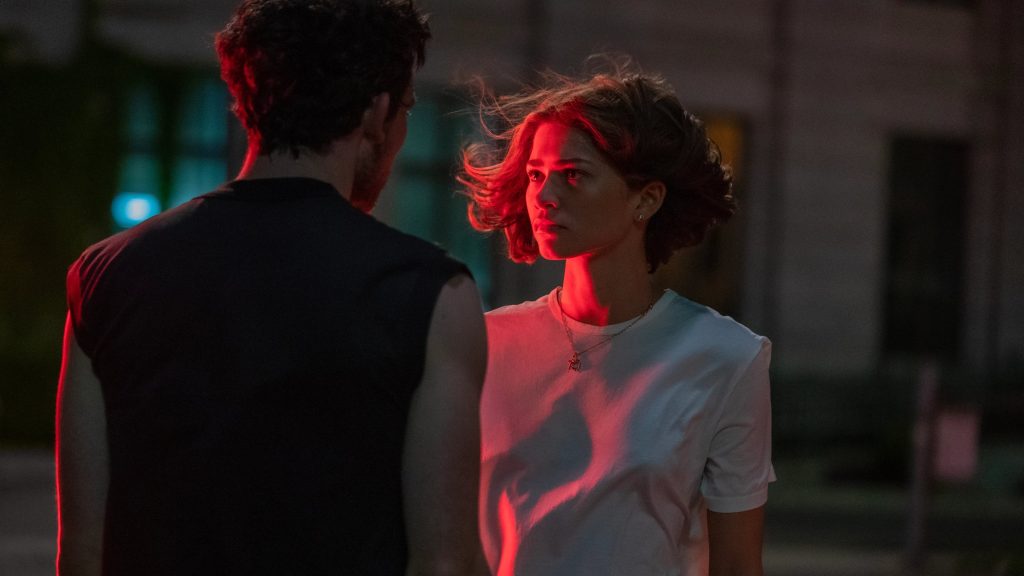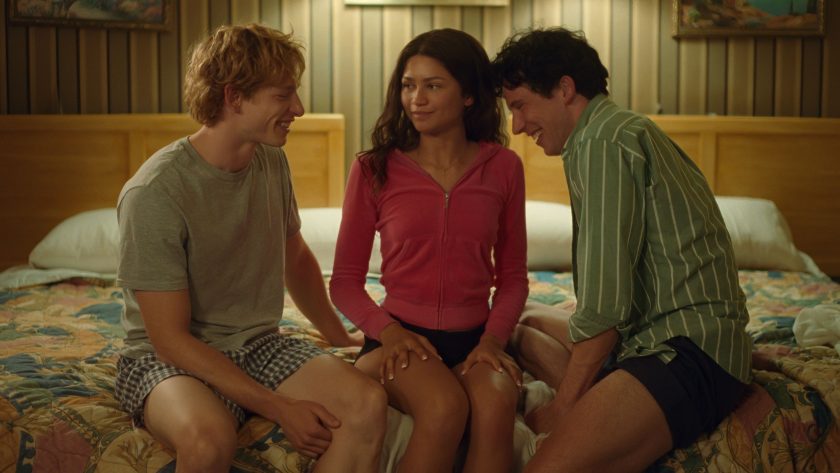Aryan Khawaja reviews Luca Guadagnino’s latest film Challengers, a decade-spanning melodrama set in the world of pro tennis that revolves around the relationship between youth superstar-turned-coach Tashi Duncan (Zendaya), her husband Art Donaldson (Mike Faist) and her former lover (and Art’s former best friend) Patrick Zweig (Josh O’Connor).
The romantic trio, call it whatever you will- a throuple, threesome, ménage-a-trois, two lovers and a cuckold- has long been a thematic cipher of inextricable significance to cinema. Take, for instance, the early films of Ernst Lubitsch, whose romantic comedies Design for Living and Trouble in Paradise navigate tenuous social contracts, petty misunderstandings and the rise and fall of turn-of-the-century decadence through the medium of freewheeling romantic skirmishes. Amongst Lubitsch’s melancholic reflections on the deafening silence of the unsaid, the filmmaker’s one and only collaboration with the inimitable Marlene Dietrich, Angel, leaves perhaps the most empty space out of all of his films between interspersions of desire. The agony of separation is one that the film seems almost too afraid to depict, instead choosing to approach through omission and the trail of damage left in its wake. Collisions of destructive passion- albeit in ways more literal than one would expect- are also the thematic crux of Frank Borzage’s Desire, which marks the reunion of Gary Cooper and Marlene Dietrich after Josef von Sternberg’s Morocco. More pertinently, that film also marked the first and only unification of two of the foremost filmmakers of the romantic comedy: Borzage, who directed the film, and Lubitsch, who produced and (reportedly) ghost-directed it. It’s a union of creative sensibilities synthesized to the effect of something altogether more alien than the oeuvres of either Borzage or Lubitsch.
That synthesis of creative sensibilities- and the contradictions between the two- are what makes Luca Guadagnino’s latest as riveting to witness as any of the Wimbledon matches that it draws upon. Following the filmmaker’s pastiche of the grotesque Americana of Badlands in Bones and All, his decade-spanning love triangle is oddly far more concerned with the intricacies of distorted physicality and destructive fetishes than his cannibal love story. Guadagnino is no stranger to keen appropriation and subversion of genre, as his remake of Suspiria is indicative of, and neither is Challengers’ screenwriter Justin Kuritzkes, whose partner Celine Song’s Academy Award-nominated Past Lives restaged the love triangle against the backdrop of cultural disconnect and intangible networks of missed connections- an environment whose intellectualization of the instinctual seems almost antithetical to the kind of pettiness-fraught drama that runs through Challengers. As if reflecting the tenets of the sport its characters play, streams of dialogue are exchanged as repartees and refutations, with little room for concern not tinged by corrosive competition to seep through. Stanford-set juvenile rivalries and the Reznor/Ross score aside, the film recalls even partly mirrors the structure of The Social Network through narrative arcs that flit between past and present, outsider and insider, gesture and observer. With each recontextualization of the innocuous, its structure becomes fraught with so much tension (sexual and otherwise) that it seems almost inevitable that release must follow- and yet, denying the audience pleasure in much the same way that Tashi (Zendaya) denies her boy-toys any fulfilment of their fantasies (or at least the heterosexual ones), the film almost never does allow for catharsis.

But where Kuritzkes’ screenplay hinges on the dialectic of competition and class, Guadagnino’s approach to the material is notably more unmoored from any conception of duality, instead honing in on the sensorial. Guadagnino’s work has always been viscerally sensual in nature, but what fascinates in witnessing the way that sensuality manifests in Challengers is its disconnection from sex, the latter of which always seems to crescendo to emotional climaxes (in both senses of the phrase) but never quite does. Instead, its sensuality emerges in the film’s treatment of delicate bodies whose maintenance is treated with the same pedigree of care as the Aston Martin supercars that the faces of its characters are used to advertise- that of bodies placed under enormous physical duress, and the shuttling between a body at the height of physical perfection and a body in decline. In a moment early on that belies the emotional distance between the two, Tashi and Art (Mike Faist) cradle each other just minutes after the latter witnesses his identity as a sportsman being subject to public critique on live television. Here, their (very literal) battle scars are visible. These scars are more mere accumulation of the physical stresses undergone by athletes-they are wounds of the pressures inflicted upon each other, with Tashi’s career-ending injury moulding her into a ruthless coach to her increasingly jaded, noncommittal husband. Such entanglements of circumstance are scattered throughout Challengers, where characters trade blows that don’t quite land until years of festering spite and regret retroactively render them momentous. The film’s melodrama and its formal restlessness, then, are inextricably intertwined, and it is in their intersection that the film transcends the countless other flaccid pastiches of the mildly homoerotic early 2000s adolescent romance (see: Saltburn) to become an entirely singular work. Much of the success of this synthesis between the two rests in the film’s deliberate creation of an unreality in service to irrevocable emotional realities, exemplified in an arresting shot-reverse shot between Tashi and Patrick (Josh O’Connor) towards the end of the film that makes use of screen-printing to isolate the two, recalling Italian neorealism (particularly Fellini) more than any of Guadagnino’s contemporaries.
In an interview 2 years ago, Guadagnino described Crimes of the Future as being an example of “a very in control filmmaker with a very clinical coldness to his art, which is true, being so warm and so tender”. I would not describe Guadagnino as “cold”, necessarily, but there is a measured laconic quality to his work that renders it soulful at its best. Both Cronenberg and Guadagnino’s latest films are rigorous in their mirroring of structure and thematic concerns- with the former’s mirroring the process of rehearsal for a theatrical performance and the latter mirroring a tennis rally. Like Cronenberg’s film, Guadagnino’s finds in the intricacies of bodily performance an eroticism more potent than sex itself- glib “tennis is the new sex” puns aside, it’s a parallel that recalls itself pretty much immediately in the film’s unrelentingly propulsive tennis matches, which disorientate to the extent that victory becomes almost entirely irrelevant.
But where seeing Cronenberg‘s film felt like the closing opus to an entire oeuvre, Challengers prompted a different but equally impassioned reaction on my part: where on earth has this Guadagnino been? Where else in his filmography has this unbelievably visceral, almost elemental sense of geography in action been present? For the most part, I was in awe of witnessing an artist I have developed a certain consistent perception of achieve something so towering- not just one of (if not the absolute) best sports films ever made, but a genuinely spirited melodrama with all the interstitial longing and split-second emotional rollercoasters that the genre demands of its best. Sirk and Lubitsch are the obvious points of comparison, but Nic Ray’s The Lusty Men is what this most closely recalled to me, especially with the aggressiveness with which POV tennis ball shots and gestural violence are deployed in a gutwrenchingly tense final match, with Sayombhu Mukdeeprom’s slick credit-card-commercial digital textures lending it a sense of heightened unreality.

Guadagnino isn’t the only artist who this marks a reinvention for- after almost a decade of middling, uninspired work (save some elements of Watchmen), Reznor and Ross finally top The Social Network with a gorgeously jagged electro-house score that I am dangerously unable to stop listening to. It’s fitting that it often drowns out conversations, since- as Tashi puts it- what the fuck else is there to talk about but tennis? There are no loyalties or really even sexual orientations in Challengers– of course Art and Patrick want to fuck each other as much as they want to fuck Tashi (and are terrible at hiding it, at that) but their attraction is predicated upon the same principles as their competition: they see something they want but have to chase, even fight, to have, and the second that thrill disappears is when the film’s characters turn on each other and lifelong loyalties melt away into nothing. It shifts from cruel fetishistic machinations to repressed homoerotic explosions of spite to a total confounding of presupposed loyalties except signals and signs known only to the players. All of this is refracted through the lens of slo-mo drops of sweat, torrential windstorms and a dislocation of perspective- we are allowed glimpses into moments that shape (and in some cases, destroy) the ménage-a-trois at the film’s centre, but we always return to the perspective of spectators who can only see these people pushed to their physical limits, and hence only ever see their emotional currents as larger-than-life. We are only ever there to, as Tashi puts it, watch some good fucking tennis.
Challengers is currently playing in theatres across the UK. Watch the trailer for the film here:




